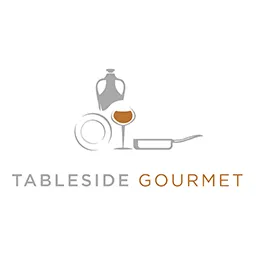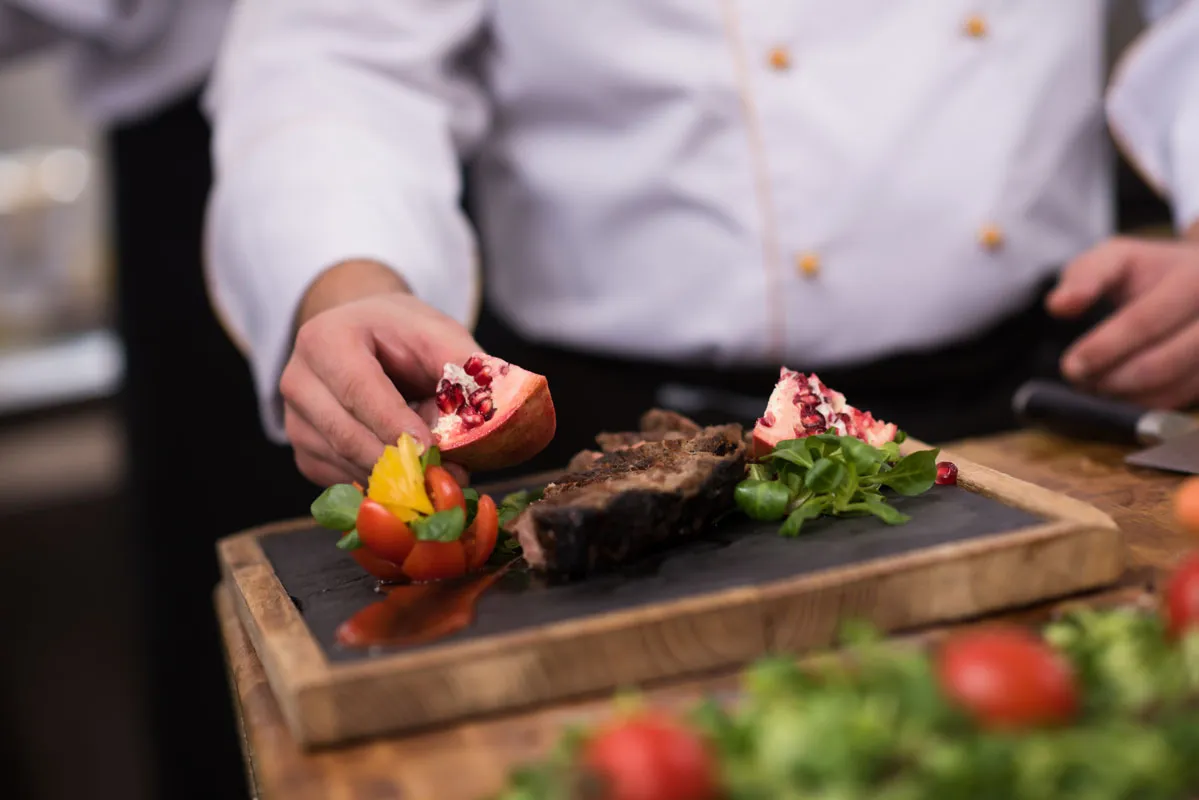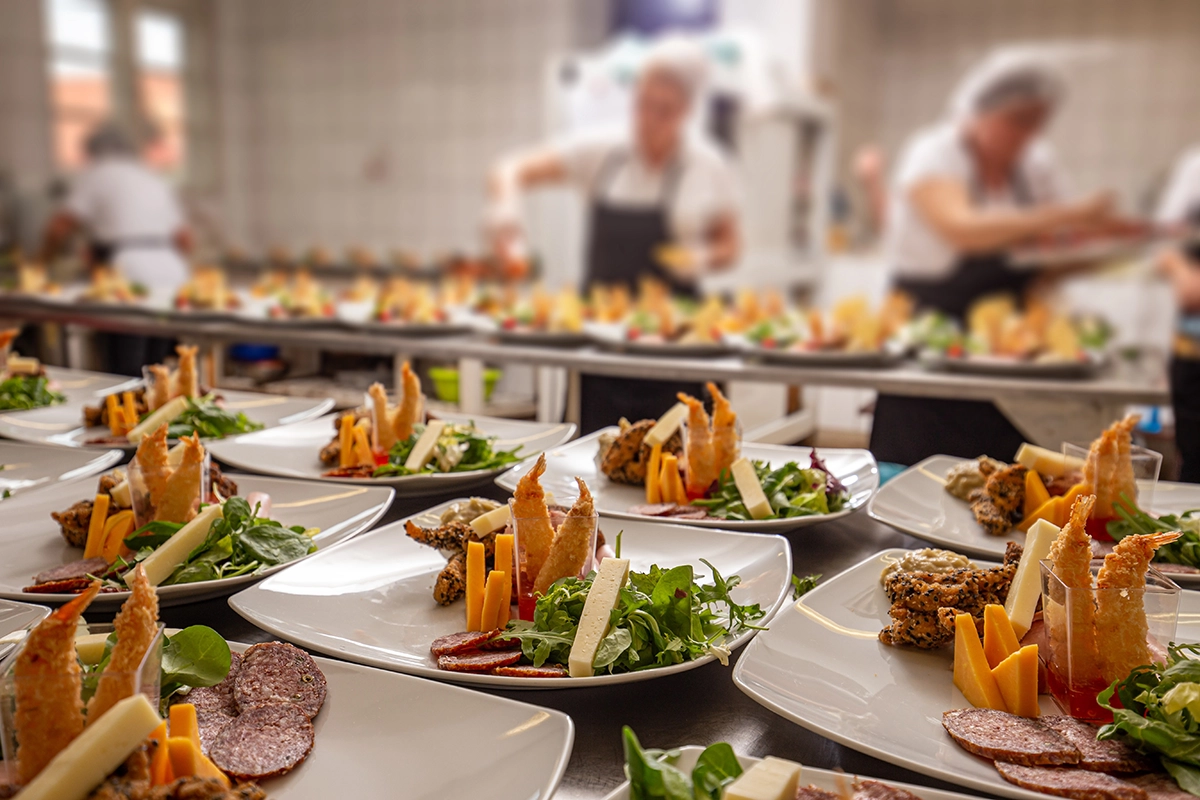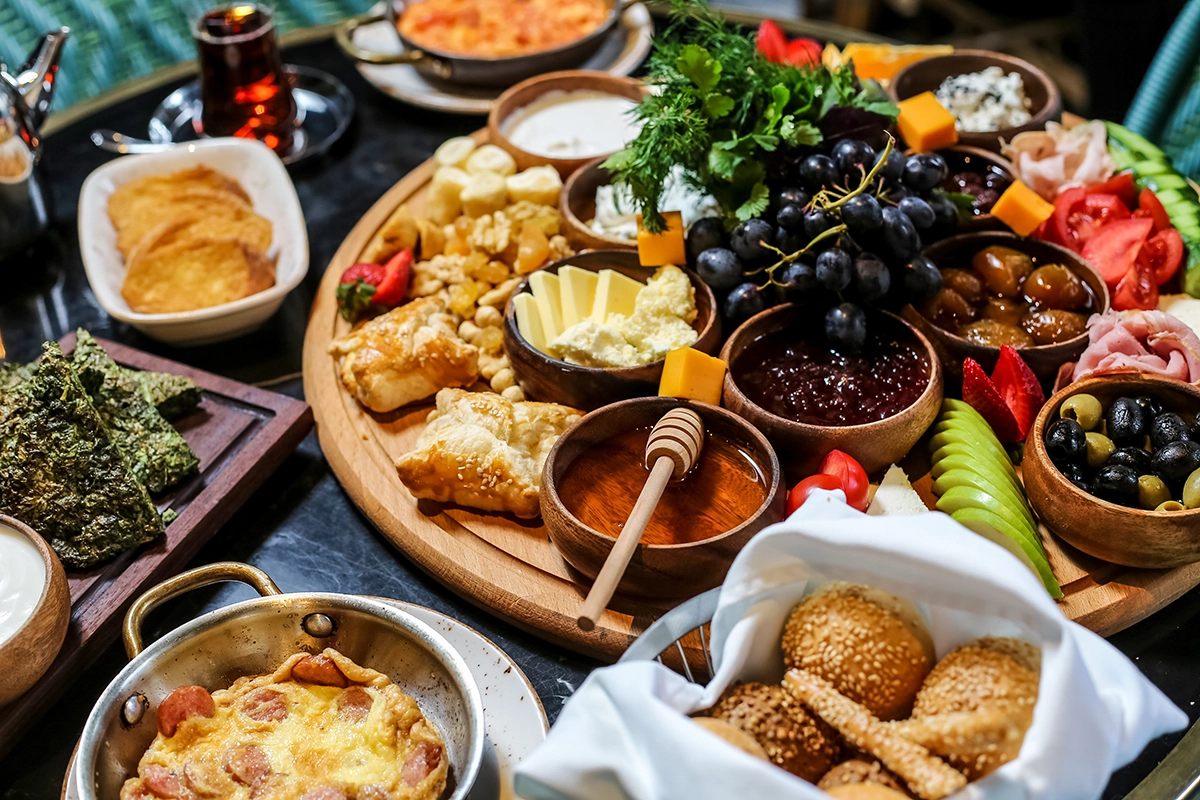Table Of Contents
Private Chef vs. Catering Team: Which is Right for Your Scottsdale Gathering? (Hint: You Might Mean Personal Chef)
Scottsdale isn’t just desert sunsets and golf courses—it’s a city that takes its food seriously. From sleek downtown dining rooms to sprawling desert estates, every gathering is a chance to turn a meal into an experience.
That brings up the big question for any event planner: do you bring in a “private chef” or hire a full catering team?
Here’s the twist: when most people say “private chef,” they’re actually looking for a personal chef for the night—someone who comes in, cooks exclusively for your group, and creates a one-off dining experience that feels tailor-made.
True private chefs, in contrast, are live-in culinary pros for a single household, which is a very different model. For those interested in a deeper explanation, we have a dedicated blogpost illustrating the difference between a private chef and a personal chef.
Today, we’ll focus on the event-specific choice: personal chef vs. catering team. By the end of this guide, you’ll know which route best suits your event size, style, and goals, whether it’s an intimate dinner for twelve or a gala under the stars with 200 guests.
1. Defining the Players: Personal Chef vs. Catering Team
Personal Chef for Events
A personal chef is ideal for smaller gatherings where intimacy and customization matter most—think milestone birthdays, anniversary dinners, or chef’s-table-style evenings in a private home.
They handle everything: menu planning, ingredient shopping, on-site cooking, elegant plating, and even cleanup.
The biggest advantage is direct interaction with the chef, who tailors the meal to your tastes and dietary needs. Typically, a single chef serves up to 15 guests comfortably, sometimes extending to 30 with an assistant.
Catering Team
Catering companies operate like well-oiled machines. With multiple staff members—cooks, servers, and supervisors—they handle scale with ease.
Caterers excel when the guest list is large (20–500+), and logistics are complex.
Menus are often pre-set or semi-customizable, with much of the prep done off-site and finalized at the venue.
Beyond food, catering teams provide full-service logistics: setup, serving, rentals, bartending, and teardown, ensuring seamless events at any scale.
2. Experience & Guest Interaction
A personal chef brings more than just food—they bring personality and presence. The evening becomes immersive, and guests are part of the culinary story.
What a personal chef brings to your event:
- Conversation at the table: Chefs explain the inspiration behind dishes, ingredients, and techniques.
- Interactive dining: Guests can customize plates or even participate in the cooking.
- Atmosphere: The chef’s presence transforms a dinner into a curated, event-like experience.
Catering teams focus on efficiency and polish. Food arrives on time, plates are cleared quickly, and everything runs smoothly.
The chef usually remains behind the scenes, while the team ensures a professional, seamless service.
The guest experience is attentive, but interaction with the chef is limited.
The choice often comes down to context: small milestone dinners, intimate gatherings, or group stays in vacation rentals benefit from personal chefs, while weddings, corporate events, and charity galas favor the professional efficiency of a catering team.
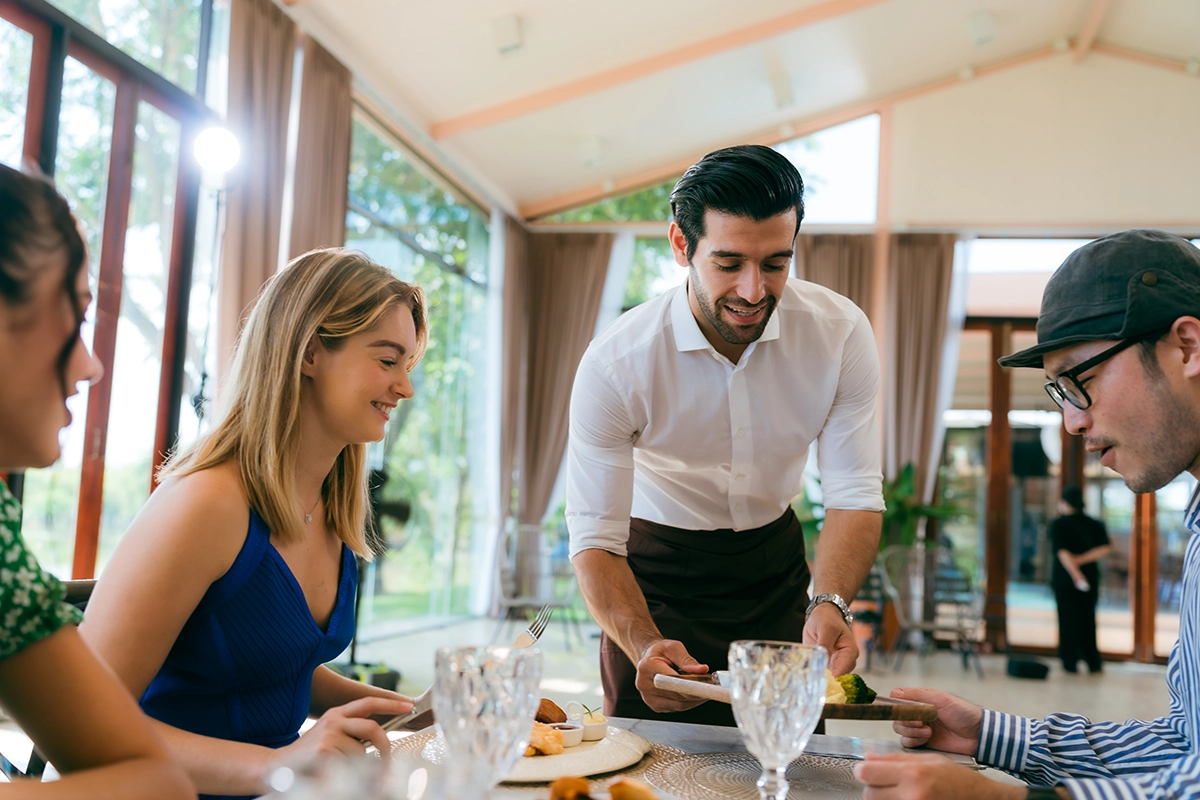
3. Event Size & Venue Fit
Scale and venue suitability are key when choosing between a personal chef and a catering team.
Personal chefs thrive in small to mid-sized gatherings—typically two to fifteen guests, sometimes up to thirty with an assistant.
Their style works beautifully in private homes, luxury condos, and vacation rentals, where the kitchen is part of the entertainment space.
The intimacy allows for interactive dining and personalized attention.
Catering teams are designed for larger audiences, from 20 guests to 500+.
Their systems, staffing, and logistics shine in ballrooms, resorts, and corporate spaces, where food quality must meet large-scale demands without compromising timing or service.
The difference is clear: personal chefs elevate the dining experience for smaller settings, while catering teams ensure seamless operations for bigger events.
4. Menu Customization & Food Quality
Personal Chef: A Culinary Experience Tailored Just for You
A personal chef transforms your gathering into more than a meal—it becomes a fully customized dining experience.
Every dish can be adapted to guest preferences, dietary restrictions, and flavor profiles.
Ingredients are fresh, locally sourced, and prepared on-site, ensuring every bite is vibrant and flavorful. Plating is done individually, creating a restaurant-quality experience at your table.
Catering Teams: Seamless Service for Larger Gatherings
Catering teams operate on set menus or package systems, designed to ensure consistency and efficiency for dozens or hundreds of guests.
Minor dietary adjustments may be possible, but bulk preparation is standard. This system prioritizes logistics and scale over real-time customization.
Catering teams shine when smooth execution, consistency, and staffing reliability matter most.
5. Logistics & Service: Who Handles What?
Hands-On and Personal: The Role of a Personal Chef
Personal chefs manage the full culinary process: shopping, preparation, cooking, and cleanup.
Boutique chefs may offer full-service options with tableware and linens, but most provide an intimate, hands-on experience, perfect for private homes or small events.
Their presence adds a personal touch and responsiveness that large catering teams cannot replicate.
Big Events, Big Teams: How Catering Works
Catering teams bring the full infrastructure—servers, bartenders, linens, rentals, setup, and post-event breakdown.
Established relationships with venues simplify planning, making them ideal for weddings, corporate events, and galas.
Their strength is efficiency and reliability, ensuring smooth execution on a large scale.
Flexibility vs. Formality: Navigating Regulations
Regulatory requirements also differ. Caterers must carry liability insurance and licenses, and comply with health regulations.
Personal chefs face lighter requirements, allowing for flexibility and direct engagement with guests—especially beneficial in private homes or smaller rentals.
6. Pricing Considerations: What You’ll Actually Pay
Personal Chefs: Small Group, Big Value
Personal chefs generally charge $99–$145 per person, often decreasing slightly as group size grows.
This rate covers menu planning, on-site preparation, plating, and cleanup, with a customary tip of around 15%.
For small gatherings, personal chefs are often more cost-effective than catering teams, which may require minimum guest counts.
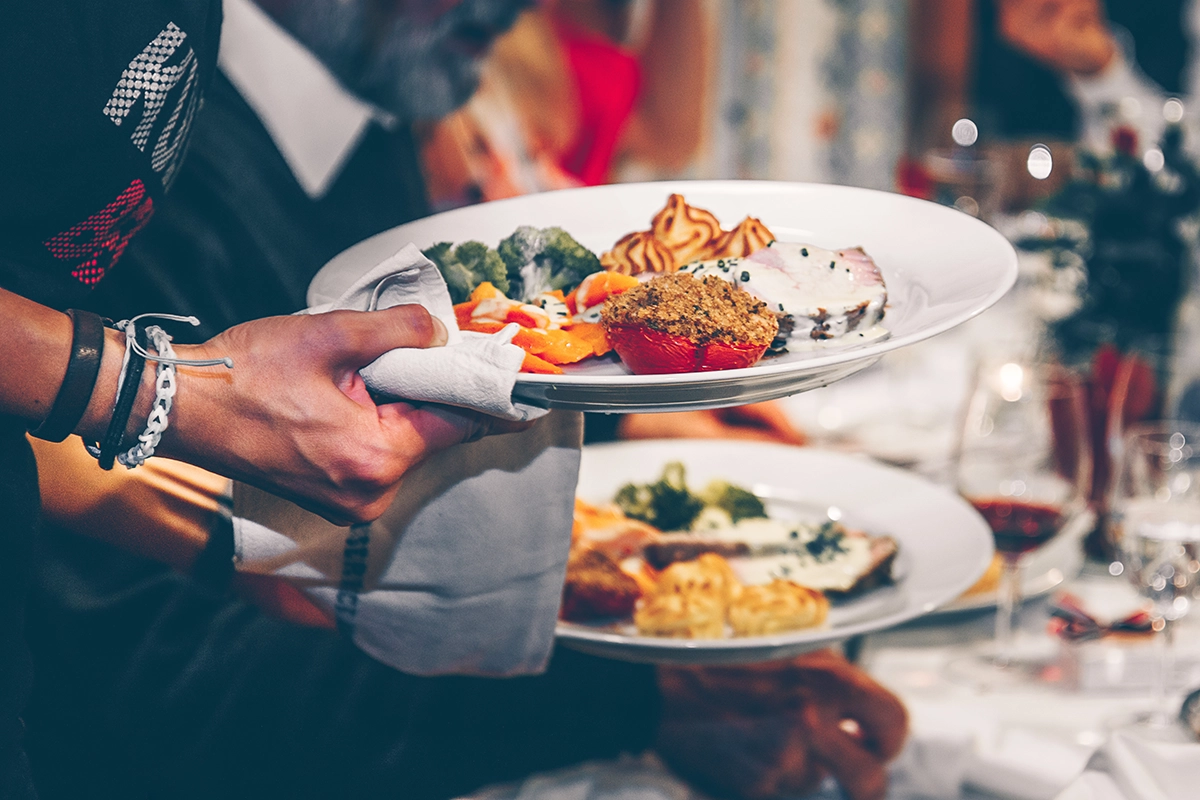
Catering Teams: Full-Service, Full Scale
Catering teams scale differently. Their pricing varies with event size, staffing, and service level.
For upscale events, per-person costs may be comparable to personal chefs, but they include servers, bartenders, linens, and equipment.
Large groups benefit from cost efficiencies through bulk preparation and staffing.
Takeaway: Personal chefs are ideal for small, intimate gatherings. Catering teams are better suited for large-scale events where scale and logistics matter most.
7. Pros & Cons: Personalized Dining vs. Large-Scale Catering
Hands-On Culinary Magic
Personal chefs specialize in fresh, customized, and interactive dining. Guests witness the cooking process, engage with the chef, and enjoy a highly personalized experience.
The theatrical aspect of live cooking turns a dinner into an event in itself.
Intimacy & Engagement
Feedback from hosts consistently highlights the memorable, personalized touch. Guests often remark on the excitement of seeing ingredients transformed into plated dishes.
The chef’s presence provides immediacy, responsiveness, and a sense of culinary theater.
Limitations arise at scale; personal chefs are less practical for very large, logistically complex events.
Efficiency at Scale
Catering teams excel in managing logistics: setup, staffing, rentals, and cleanup are handled seamlessly.
This makes them ideal for weddings, corporate events, and galas.
The tradeoff is a less personalized experience, as food is prepared in bulk and interaction with the chef is limited.
Making the Right Choice
The decision comes down to priorities: intimacy and interaction favor a personal chef, while scale, coordination, and reliability favor a catering team.
Real-world feedback consistently shows guests value chef-driven experiences for smaller gatherings, while larger events benefit from professional catering operations.
8. Real-World Experiences & Guest Feedback
Elevated Experiences in Every Meal
Personal chefs consistently receive high praise for hands-on service, attention to detail, and presentation.
Guests often describe the experience as transformative, noting that watching a chef in action turns a dinner into a memorable, interactive event.
Menus That Adapt on the Fly
One major advantage of a personal chef is real-time customization. Dishes can be adjusted for dietary preferences, last-minute requests, or seasonal ingredients.
Guests often highlight how this flexibility creates a sense of care and personal attention that larger catering operations cannot match.
Small Events Caterers Often Skip
Traditional catering often requires minimum guest counts, making intimate events challenging.
While catering teams excel at large-scale events, personal chefs fill the gap for smaller gatherings, offering flexibility, freshness, and responsiveness.
Regulatory Flexibility
Personal chefs benefit from lighter regulations compared to licensed caterers.
While caterers may be required for public venues, chefs can operate in private homes or smaller rental spaces, giving hosts access to premium dining experiences without complex logistics.
9. Practical Takeaways: Making the Right Choice for Your Event
Choosing between a personal chef and a catering team comes down to event size, style, and desired experience.
Personal chefs excel in intimate gatherings, providing restaurant-quality meals, interactive service, and menu flexibility. They are ideal for:
- Small groups: 2–15 guests, occasionally up to 30.
- Milestone celebrations: birthdays, anniversaries, private dinners.
- Special experiences: bachelorette parties, vacation rental stays, or luxury retreats.
Catering teams shine for large-scale events where logistics, staffing, and efficiency are priorities. They handle servers, bartenders, linens, rentals, setup, and cleanup, ensuring smooth execution for:
- Weddings, corporate events, or galas: 50–500+ guests.
- Licensed venue requirements: events requiring insured, certified vendors.
- High-volume logistics: where interaction with a chef is secondary.
Bottom line: Personal chefs deliver intimate, interactive, and memorable experiences, while catering teams provide seamless efficiency at scale.

10. Conclusion: Elevate Your Event with the Right Culinary Choice
Both personal chefs and catering teams can elevate any gathering, but the right choice depends on event size, setting, and desired experience.
If your goal is culinary theater and engagement, where guests connect directly with the preparation and presentation, a personal chef is unmatched.
For events where efficiency, staffing, and flawless execution are critical, a catering team offers structure, reliability, and peace of mind.
Consider the vibe you want: an intimate, memorable evening with hands-on culinary artistry, or a large-scale seamless event where logistics run smoothly behind the scenes.
The answer will guide your choice, ensuring guests leave with lasting memories of both flavor and experience.
Frequently Asked Questions
1. Can a personal chef handle dietary restrictions and allergies on the spot?
Yes. One of the biggest advantages of hiring a personal chef is real-time menu flexibility. They can adjust dishes for food allergies, dietary restrictions, or last-minute guest preferences, ensuring everyone feels accommodated and cared for.
2. What is the ideal event size for a personal chef versus a catering team?
Personal chefs shine in intimate gatherings, typically 2–15 guests, occasionally up to 30 with an assistant. Catering teams are best for larger-scale events, from 50 guests to 500+, where logistics, staffing, and service speed are essential.
3. How does pricing differ between a personal chef and a catering team?
Personal chefs usually charge per person ($99–$145), covering menu planning, cooking, plating, and cleanup. Catering teams also charge per person but include servers, bartenders, linens, rentals, and full-event logistics. Small groups may find personal chefs more cost-effective, while larger events benefit from catering efficiency.
4. Are personal chefs suitable for special experiences like vacation rentals or boutique gatherings?
Absolutely. Personal chefs excel in settings where interaction, presentation, and customization enhance the experience. Guests often remark on the immersive quality of watching meals prepared live, which makes birthdays, bachelorette parties, and luxury retreats especially memorable.
5. What are the key differences in regulations and setup between a personal chef and a catering team?
Catering teams must comply with strict licensing, insurance, and health regulations, particularly for public or commercial venues. Personal chefs operate with lighter regulatory requirements, making them ideal for private homes or smaller rental spaces while still delivering premium dining experiences.

